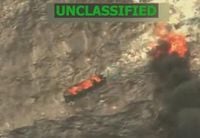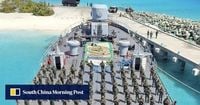In a dramatic escalation of U.S. military operations in the Caribbean, President Donald Trump announced on September 19, 2025, that American forces had carried out their third lethal strike this month against a vessel accused of drug trafficking and ties to terrorism. The operation, ordered by Trump and executed under the authority of U.S. Southern Command, resulted in the deaths of three men aboard the targeted boat, which officials described as a “narcoterrorist” vessel transiting international waters along a well-known narcotrafficking corridor.
"On my Orders, the Secretary of War ordered a lethal kinetic strike on a vessel affiliated with a Designated Terrorist Organization conducting narcotrafficking in the USSOUTHCOM area of responsibility," Trump declared in a post on his Truth Social platform, as reported by multiple outlets including CBS News and AFP. The president did not specify the name of the terrorist group or the country of origin for the vessel, but intelligence sources cited by Trump confirmed the boat was carrying illicit narcotics destined for the United States.
The strike, which left the vessel engulfed in flames as shown in aerial footage released by the White House, marked the latest in a series of aggressive U.S. actions aimed at disrupting what the administration describes as a growing threat of narcotics and terrorism emanating from Venezuela and its surrounding waters. "STOP SELLING FENTANYL, NARCOTICS, AND ILLEGAL DRUGS IN AMERICA, AND COMMITTING VIOLENCE AND TERRORISM AGAINST AMERICANS!!!" Trump wrote in his warning to criminal networks, as quoted by The New York Post and Al Jazeera.
According to the president and corroborated by CBS News, no U.S. personnel were harmed during the attack, which took place in international waters. The operation follows two similar strikes earlier in September: the first, on September 2, targeted a boat linked to Tren de Aragua—an organization the Trump administration has designated a Foreign Terrorist Organization—killing 11 suspected members; the second, on September 15, targeted another vessel allegedly smuggling narcotics from Venezuela, resulting in three more deaths. With Friday’s action, the total number of people killed in U.S. counter-narcotics operations in the region has risen to 17, as detailed by AFP and CBS News.
The military campaign is supported by a formidable deployment of American naval and air power. At least eight warships, some with amphibious assault capabilities, have been stationed off the Venezuelan coast, and as many as ten F-35 fighter jets have been sent to Puerto Rico for anti-cartel operations, according to CBS News and AFP. The U.S. Southern Command, based in Doral, Florida, oversees these operations across 31 countries in South and Central America and the Caribbean. The administration has characterized the campaign as a top national security priority and a necessary step to protect American communities from narcotics-related violence and foreign-sponsored terrorism.
The strikes have pushed already fraught relations between Washington and Caracas to the brink. Venezuelan President Nicolás Maduro, who faces U.S. drug-trafficking charges and a $50 million reward for information leading to his arrest, has accused the Trump administration of waging an “undeclared war” against his country. In response to the U.S. military buildup, Venezuela launched three days of military exercises on its Caribbean island of La Orchila and called on citizens to join militia training. Maduro has repeatedly denied all U.S. allegations of drug trafficking and regime-sponsored terrorism, instead accusing Washington of seeking violent regime change across Latin America. "Respect sovereignty, the right to peace, [and] independence," Maduro urged, as reported by Al Jazeera.
Venezuelan Defense Minister Vladimir Padrino Lopez condemned the U.S. actions as executions without due process. "It is an undeclared war, and you can already see how people, whether or not they are drug traffickers, have been executed in the Caribbean Sea," Lopez said during a military exercise, echoing concerns that the victims had been "executed without the right to a defence." This sentiment has fueled calls from Caracas for a United Nations investigation into the strikes.
While the Trump administration has maintained that the operations are lawful and necessary, the strikes have drawn sharp criticism from U.S. lawmakers, human rights groups, and legal scholars. Several Democratic members of Congress have argued that the administration has not provided a sufficient legal basis for the use of military force in these cases. "President Trump's actions are an outrageous violation of the law and a dangerous assault on our Constitution," said Senator Jack Reed of Rhode Island, the top Democrat on the Senate Armed Services Committee, in a statement reported by CBS News. "No president can secretly wage war or carry out unjustified killings – that is authoritarianism, not democracy."
Sarah Yager, Washington director at Human Rights Watch, also raised alarms about the legality of the operations under international law. "US officials cannot summarily kill people they accuse of smuggling drugs. The problem of narcotics entering the United States is not an armed conflict, and US officials cannot circumvent their human rights obligations by pretending otherwise," Yager told Al Jazeera. Legal experts have pointed out that international and U.S. law tightly restrict the use of lethal force outside declared war zones, and that targeting civilians—regardless of alleged criminal ties—could constitute a war crime unless justified by imminent danger.
Despite the controversy, the White House has maintained that the strikes fall within the president’s constitutional authority as commander in chief. In a notification to Congress, the administration stated: "I directed these actions consistent with my responsibility to protect Americans and United States interests abroad and in furtherance of United States national security and foreign policy interests, pursuant to my constitutional authority as commander in chief and chief executive to conduct United States foreign relations."
Meanwhile, opposition voices within Venezuela have also weighed in. Henrique Capriles, a prominent opposition leader and two-time presidential candidate, rejected both the Maduro government and the U.S. military intervention. "I continue to believe that the solution is not military, but political," Capriles said, warning that U.S. strikes risk entrenching those in power rather than fostering change.
The ongoing U.S. campaign has left the region on edge, with neighboring countries and international observers worried that further escalation could destabilize an already volatile geopolitical environment. As the Trump administration doubles down on its strategy of military force to combat narcotrafficking and terrorism, the debate over legality, effectiveness, and unintended consequences shows no sign of abating.
For now, the waters off Venezuela remain tense, and the world is watching closely to see whether this high-stakes confrontation will spiral into something even more dangerous.


